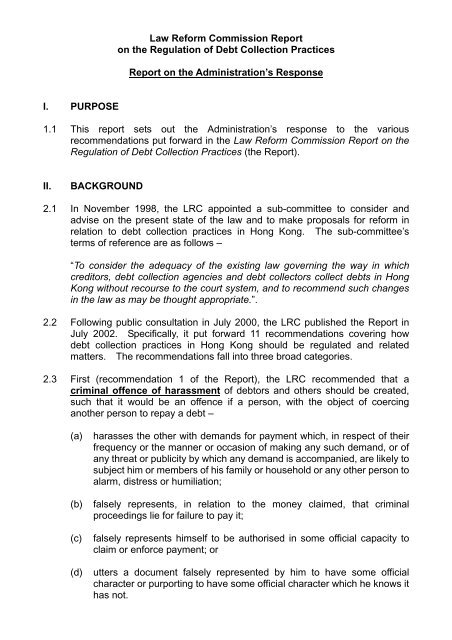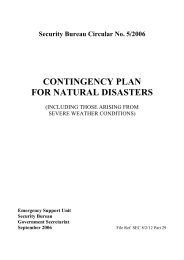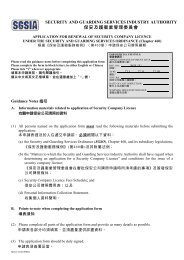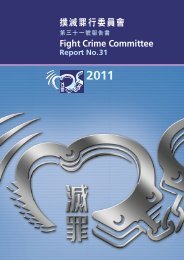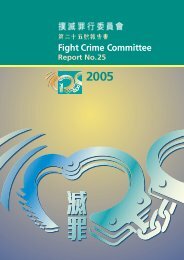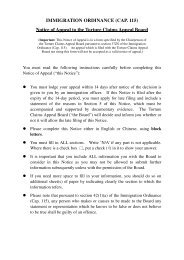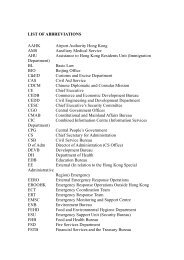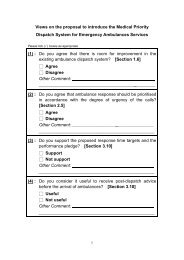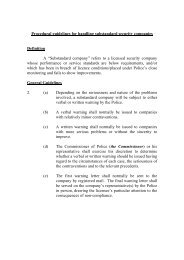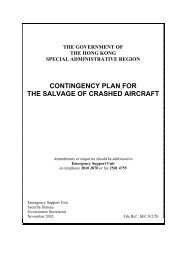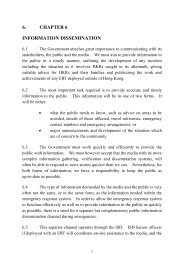Law Reform Commission Report
Law Reform Commission Report
Law Reform Commission Report
Create successful ePaper yourself
Turn your PDF publications into a flip-book with our unique Google optimized e-Paper software.
<strong>Law</strong> <strong>Reform</strong> <strong>Commission</strong> <strong>Report</strong><br />
on the Regulation of Debt Collection Practices<br />
<strong>Report</strong> on the Administration’s Response<br />
I. PURPOSE<br />
1.1 This report sets out the Administration’s response to the various<br />
recommendations put forward in the <strong>Law</strong> <strong>Reform</strong> <strong>Commission</strong> <strong>Report</strong> on the<br />
Regulation of Debt Collection Practices (the <strong>Report</strong>).<br />
II.<br />
BACKGROUND<br />
2.1 In November 1998, the LRC appointed a sub-committee to consider and<br />
advise on the present state of the law and to make proposals for reform in<br />
relation to debt collection practices in Hong Kong. The sub-committee’s<br />
terms of reference are as follows –<br />
“To consider the adequacy of the existing law governing the way in which<br />
creditors, debt collection agencies and debt collectors collect debts in Hong<br />
Kong without recourse to the court system, and to recommend such changes<br />
in the law as may be thought appropriate.”.<br />
2.2 Following public consultation in July 2000, the LRC published the <strong>Report</strong> in<br />
July 2002. Specifically, it put forward 11 recommendations covering how<br />
debt collection practices in Hong Kong should be regulated and related<br />
matters. The recommendations fall into three broad categories.<br />
2.3 First (recommendation 1 of the <strong>Report</strong>), the LRC recommended that a<br />
criminal offence of harassment of debtors and others should be created,<br />
such that it would be an offence if a person, with the object of coercing<br />
another person to repay a debt –<br />
(a) harasses the other with demands for payment which, in respect of their<br />
frequency or the manner or occasion of making any such demand, or of<br />
any threat or publicity by which any demand is accompanied, are likely to<br />
subject him or members of his family or household or any other person to<br />
alarm, distress or humiliation;<br />
(b) falsely represents, in relation to the money claimed, that criminal<br />
proceedings lie for failure to pay it;<br />
(c) falsely represents himself to be authorised in some official capacity to<br />
claim or enforce payment; or<br />
(d) utters a document falsely represented by him to have some official<br />
character or purporting to have some official character which he knows it<br />
has not.
- 2 -<br />
2.4 Second (recommendations 2 – 10 of the <strong>Report</strong>), the LRC recommended that<br />
debt collection agencies and individual debt collectors should be subject to a<br />
statutory licensing system under which it would be a criminal offence to<br />
collect debt as a business without a valid licence. For this purpose, a<br />
licensing authority should be established with various statutory powers and<br />
duties in relation to the issuance, renewal, suspension and revocation of<br />
licences. The licensing authority should also be required to formulate a code<br />
of practice to provide guidance on the standard of conduct of debt collectors.<br />
2.5 Third (recommendation 11 of the <strong>Report</strong>), the LRC recommended that the<br />
sharing of consumer credit data be kept under review with a view to further<br />
alleviating bad debts and abusive debt collection practices.<br />
2.6 An extract from the <strong>Report</strong> summarising these recommendations is at<br />
Annex A.<br />
III.<br />
CONSIDERATIONS<br />
3.1 The Administration has thoroughly studied the findings and recommendations<br />
of the <strong>Report</strong>. The following agencies have participated in the process –<br />
(a)<br />
(b)<br />
(c)<br />
(d)<br />
(e)<br />
(f)<br />
(g)<br />
(h)<br />
(i)<br />
(j)<br />
(k)<br />
Security Bureau<br />
Financial Services and Treasury Bureau<br />
Economic Development and Labour Bureau<br />
Home Affairs Bureau<br />
Administration Wing of Chief Secretary for Administration’s Office<br />
Business Facilitation Division of Financial Secretary’s Office<br />
Hong Kong Police Force<br />
Social Welfare Department<br />
Companies Registry<br />
Department of Justice<br />
Hong Kong Monetary Authority.<br />
In addition, we have sought comments from the Judiciary on judicial process<br />
efficiency.<br />
3.2 In formulating its response to the <strong>Report</strong>’s recommendations, the<br />
Administration has taken into account a number of factors and considerations,<br />
as well as developments subsequent to the publication of the <strong>Report</strong>. These<br />
are elaborated in the ensuing paragraphs.<br />
Rights of Creditors and Debtors<br />
3.3 At the outset, we agree with the LRC 1 that credit providers and their agents<br />
are entitled to take reasonable steps to ensure that debtors meet their<br />
1<br />
See paragraph 10.2 of the LRC <strong>Report</strong>.
- 3 -<br />
obligations. This is a necessary incident of the debtor-creditor relationship<br />
and should be duly respected. Otherwise prudent credit providers would be<br />
discouraged from providing credit, and the efficient functioning of proper<br />
business operators and the trade as a whole would be unnecessarily inhibited.<br />
An appropriate balance should be struck between the legitimate needs of<br />
creditors to collect debts on the one hand, and the rights of debtors not to be<br />
subject to unreasonable pressure and of third parties not to be unduly<br />
disturbed on the other. In this connection, we note that during the LRC’s<br />
public consultation on the subject prior to its finalization of the report on debt<br />
collection, there was concern among credit providers and collection agencies<br />
at the proposed harassment offence.<br />
Complaints Regarding Debt-collection Practices<br />
3.4 According to Police’s records, statistics on debt collection-related reports<br />
received from 2001 to 2004 are as follows –<br />
Offence/Complaint 2001 2002 2003 2004<br />
Criminal damage 1 497 1 482 1 558 1 534<br />
Crime <strong>Report</strong>s<br />
Non-crime <strong>Report</strong>s<br />
Criminal intimidation 261 166 215 305<br />
Serious assault 90 77 71 64<br />
Arson 41 22 22 11<br />
False imprisonment 23 20 18 15<br />
Others 47 61 109 59<br />
Sub-total 1 959 1 828 1 993 1 988<br />
Telephone nuisance 4 793 6 578 6 503 3 685<br />
Nuisance by visits 4 188 5 254 6 505 3 521<br />
Minor assault 46 403 25 29<br />
Others 4 326 5 668 5 410 3 259<br />
“Low Threat” cases - - - 9 935 2<br />
Sub-total 13 353 17 903 18 443 20 429<br />
TOTAL 15 312 19 731 20 436 22 417<br />
3.5 It can be noted that whilst the number of crime reports has remained stable in<br />
the past few years, the number of non-crime complaints has recorded an<br />
increase. The reports in the latter category included making numerous<br />
dunning telephone calls, making repeated visits to the victims’ place of<br />
2<br />
With effect from 1 June 2004, Police’s practice in dealing with the debt collection activity has been further<br />
streamlined. Non-crime <strong>Report</strong>s are further classified as “high-threat” and “low-threat” cases. “High-threat”<br />
reports are those likely to escalate into criminal activity.
- 4 -<br />
residence or work, posting of debt collection notices and so on.<br />
3.6 Since March 2002, all authorised institutions (AIs) are required to submit a<br />
quarterly return to the Hong Kong Monetary Authority on the number of<br />
complaints received against the debt collection agencies that they employ.<br />
The results of the survey are set out in the following table –<br />
Year<br />
2002<br />
2003<br />
2004<br />
Quarter<br />
No. of debt collection agencies-related<br />
complaints reported by AIs<br />
2 nd 374<br />
3 rd 283<br />
4 th 260<br />
1 st 231<br />
2 nd 181<br />
3 rd 166<br />
4 th 139<br />
1 st 101<br />
2 nd 88<br />
3 rd 90<br />
4 th 62<br />
It can be seen that the number of complaints has been on a decreasing trend.<br />
Existing Criminal Sanctions and Enforcement<br />
3.7 At present, a number of legislative provisions are already in place to combat<br />
abusive practices employed by debt collection agencies. These cover, inter<br />
alia, offences set out in the following table –<br />
Ordinance Section Offence<br />
Crimes Ordinance<br />
(Cap. 200)<br />
Theft Ordinance<br />
(Cap. 210)<br />
24 Intimidation<br />
25 Assaults with intent to cause certain acts<br />
to be done or omitted<br />
60 Destroying or damaging property<br />
61 Threats to destroy or damage property<br />
23 Blackmail
- 5 -<br />
Ordinance Section Offence<br />
Offences Against the<br />
Person Ordinance<br />
(Cap. 212)<br />
Summary Offences<br />
Ordinance<br />
(Cap. 228)<br />
Societies Ordinance<br />
(Cap. 151)<br />
Post Office Ordinance<br />
(Cap. 98)<br />
15 Sending letter threatening to murder<br />
17 Wounding with intent to do grievous<br />
bodily harm<br />
19 Wounding or inflicting grievous bodily<br />
harm<br />
39 Assault occasioning actual bodily harm<br />
40 Common assault<br />
42 Forcible taking or detention of persons<br />
4(22) Disturbing any inhabitant by pulling or<br />
ringing any door bell, or by knocking or<br />
striking at any door without lawful excuse<br />
8 Writing upon, soiling, defacing or<br />
marking any building, wall, fence or<br />
paling with chalk or paint or in any other<br />
way whatsoever; or wilfully breaking,<br />
destroying or damaging any part of the<br />
building, wall, fence or paling, or any<br />
fixture or appendage thereof, without the<br />
consent of the owner<br />
19(2) Being any office-bearer or any person<br />
professing or claiming to be an<br />
office-bearer and any person managing<br />
or assisting in the management of any<br />
unlawful society<br />
20(2) Acting or claiming to be a member of the<br />
triad society<br />
32(1)(f)<br />
Sending by post any obscene, immoral,<br />
indecent, offensive or libellous writing,<br />
picture or other thing<br />
3.8 It is evident that there is a wide range of criminal sanctions to deal with<br />
unscrupulous tactics employed by debt collection agencies. Nevertheless,<br />
as set out in the LRC <strong>Report</strong> 3 , according to experience many crimes involving<br />
debt collection are not reported to the Police. Debtors and victims of the<br />
reported cases may also be reluctant to cooperate with the Police. Possible<br />
reasons are that the debtors do not wish to disclose their debt problems, or<br />
the circumstances leading to the debt, to their families, business associates or<br />
others. In cases where the victims are unwilling to report the crime or to<br />
identify the culprits, despite the availability of existing criminal law, the Police<br />
will not be able to undertake the necessary investigation or initiate prosecution.<br />
The extent to which such factors may affect the effectiveness of new criminal<br />
sanctions will, therefore, need to be carefully considered.<br />
3 See paragraph 6.1 of the LRC <strong>Report</strong>.
- 6 -<br />
3.9 As regards law enforcement practices, the Police have specific procedures for<br />
the handling and investigation of debt collection related cases. A Criminal<br />
Investigation Team (CIT) looks into all crime reports as well as “high threat”<br />
non-crime reports related to debt collection. Crime reports are those<br />
involving criminal activities. “High-threat” non-crime reports are those having<br />
one or more of the following characteristics –<br />
(a) the act itself has aggravating factors (e.g. common assault, show of<br />
force, triad affiliation etc);<br />
(b)<br />
(c)<br />
the collection of debt is pursuant to a debt arising from an illegal activity<br />
(e.g. gambling, loansharking, smuggling);<br />
the collection of debt is pursuant to a legitimate debt but with hidden and<br />
exorbitant charge(s) in seeking the loan or for default in payment; or<br />
(d) any other cases which in the opinion of the Assistant Divisional<br />
Commander (Crime)/Chief Inspector (Crime) should be investigated by a<br />
Crime Team.<br />
Unlike other non-crime reports, the CIT will take initial action to investigate the<br />
non-crime reports related to debt collection classified as “high-threat”. Within<br />
48 hours of receiving the report, the team Inspector will submit the case<br />
papers to his or her senior who will decide whether it should remain with the<br />
CIT.<br />
3.10 The Police have also introduced guidelines on investigative practices for<br />
dealing with Macau loansharking cases, and have maintained close liaison<br />
with the Macau Police on investigation of such cases.<br />
Existing Administrative Measures<br />
3.11 Apart from legislation, there are also various administrative measures<br />
governing debt collection practices. The Code of Banking Practice (the<br />
Code), issued by the Hong Kong Association of Banks and DTC Association,<br />
specifies that AIs should prohibit their debt collection agencies from collecting<br />
debts by harassment or other improper means. The Hong Kong Monetary<br />
Authority monitors AIs’ compliance with the Code as part of its regular<br />
supervision. It also encourages AIs to tighten up their monitoring of debt<br />
collection agencies and to ensure that they comply with the Code through the<br />
requirement for quarterly returns (para.3.6 above). Since the introduction of<br />
the survey, the number of debt collection agencies-related complaints in<br />
relation to AIs has been decreasing, indicating that AIs have strengthened<br />
their supervision over the conduct of debt collection agencies.<br />
3.12 Apart from regulation, timely counselling and welfare assistance are provided<br />
to needy persons with debt problems. A range of services are provided by<br />
both the Social Welfare Department and non-governmental organisations in
- 7 -<br />
this regard.<br />
3.13 The Social Welfare Department has an extensive network of Integrated<br />
Family Service Centres in the Special Administrative Region providing<br />
counselling and assistance to the needy, including those in debt, to tackle<br />
their personal and family problems. Social workers of these centres provide<br />
counselling, arrange welfare assistance and organise support groups to help<br />
them enhance their stress-coping skills and work out positive ways to resolve<br />
their debt problems. Services by clinical psychologists or psychiatric<br />
treatment will be provided as necessary for those who are in a state of<br />
depression or severe emotional distress because of their debt problem.<br />
3.14 The following services are provided by non-governmental organisations to<br />
help those with debt problems –<br />
(a)<br />
(b)<br />
The Family Crisis Support Centre of the Caritas runs the “Debt<br />
Counselling Project”, with lawyers and accountants providing<br />
professional legal and financial advice to those in need.<br />
The Tung Wah Group of Hospitals, through its “Healthy Budgeting<br />
Family Debt Counselling Centre”, renders financial counselling and free<br />
professional accounting consultation.<br />
3.15 Furthermore, various forms of housing assistance may be offered to people<br />
with debt problems. For instance, those in long-term financial problem such<br />
as bankruptcy and negative equity property ownership with properties<br />
surrendered to the banks may be recommended for compassionate rehousing,<br />
having regard to their social and/or medical circumstances. Public housing<br />
tenants being intimidated by their creditors may be recommended to the<br />
Housing Department for consideration of a housing transfer.<br />
3.16 Any further regulatory or administrative measures should be implemented<br />
only if they could bring about enhancement or added benefits to the existing<br />
measures.<br />
Judicial Process Efficiency<br />
3.17 During the public consultation carried out by the LRC in 2000 and at other<br />
forums, it was suggested that the long-term solution to the problem of abusive<br />
debt collection should lie in strengthening the judicial process both in terms of<br />
adjudication of debts and enforcement of judgments. In other words, the<br />
efficiency of the judicial process for recovering debts should be an integral<br />
part of the overall review of the problem of abusive debt collection.<br />
3.18 In this regard, we understand that over the years the Judiciary has taken<br />
forward a number of initiatives to improve judicial process efficiency. Some<br />
of these initiatives were formulated or introduced subsequent to the<br />
publication of the LRC <strong>Report</strong>.
- 8 -<br />
3.19 First, in February 2000 the Chief Justice appointed a Working Party on Civil<br />
Justice <strong>Reform</strong> to review the civil rules and procedures of the High Court, and<br />
to recommend changes thereto, with a view to ensuring and improving access<br />
to justice at reasonable cost and speed. The Final <strong>Report</strong> of the Working<br />
Party was published on 3 March 2004. One of the recommendations of the<br />
Working Party was the introduction of a system of “sanctioned offers and<br />
payments” which may encourage earlier settlement of actions including<br />
actions for the enforcement of debts. This involves one party making offers<br />
or payments into court to settle a dispute. If the other party does not accept<br />
the offer, he runs the risk of costs and interest sanctions if he or she<br />
subsequently fails at the trial to better what was offered, even if he or she wins<br />
the action. Though not specifically targeted at the problem of debt collection,<br />
it may directly assist in that parties would be encouraged to settle cases at an<br />
early stage and thus avoid prolonged and expensive litigation.<br />
3.20 In addition, the Judiciary has reviewed the procedures of civil proceedings in<br />
the District Court and Small Claims Tribunal in the past few years, with a view<br />
to further enhancing access to justice. The jurisdictional limit of the District<br />
Court was increased from $120,000 to $600,000 from 1 September 2000, and<br />
subsequently further to $1 million with effect from 1 December 2003. This<br />
has enabled claims involving amounts in this range to be dealt with by the<br />
District Court, which should involve lower costs, everything else being equal.<br />
The number of civil cases handled by the District Court has seen an increase<br />
since implementation of the new initiatives, i.e. by 12% from 32 515 in 2000 to<br />
36 460 in 2004. In the same period, the waiting time in respect of civil cases<br />
has reduced from 82 days to 54 days.<br />
3.21 As for the Small Claims Tribunal, its jurisdictional limit was increased from<br />
$15,000 to $50,000 in October 1999. Since then, its caseload has seen a<br />
significant increase, from 57 442 in 1999 to 88 242 in 2004, representing a<br />
jump of 54%. This suggests that over the years an increasing number of<br />
creditors are making use of the judicial process to recover debts.<br />
3.22 It is also worth noting that the waiting time for enforcement of court orders in<br />
respect of judgment debts has stayed reasonably at 10 days.<br />
Harassment in General<br />
3.23 Another area of the LRC’s recent work deals with harassment and this may be<br />
also relevant in the present context. Following public consultation in 1998,<br />
the LRC published its <strong>Report</strong> on Stalking in October 2000. The concerns<br />
that the report seeks to address have some similarity with those covered by<br />
the <strong>Report</strong> on the Regulation of Debt Collection Practices 4 . The LRC has<br />
also identified debt collectors as an example of possible stalkers.<br />
4 For example, some definitions of “stalking” quoted in the report include “the pursuit by one person of what<br />
appears to be a campaign of harassment or molestation”, “behaviour which subjects another to a course of<br />
persistent conduct, whether active or passive, which taken together over a period of time amounts to<br />
harassment or pestering”.
- 9 -<br />
3.24 The LRC <strong>Report</strong> on Stalking has recommended, inter alia, the creation of a<br />
new offence of harassment, as follows -<br />
(a)<br />
a person who pursues a course of conduct which amounts to<br />
harassment of another, and which he knows or ought to know amounts<br />
to harassment of the other, should be guilty of a criminal offence;<br />
(b) for the purpose of this offence, the harassment should be serious<br />
enough to cause that other person alarm or distress; and<br />
(c) a person ought to know that his course of conduct amounts to<br />
harassment of another if a reasonable person in possession of the same<br />
information would think that the course of conduct amounted to<br />
harassment of the other.<br />
An extract from the LRC <strong>Report</strong> on Stalking summarising its<br />
recommendations is at Annex B.<br />
3.25 The general harassment offence proposed in the LRC <strong>Report</strong> on Stalking<br />
seeks to deal with behaviour regardless of its ultimate purpose, if any, and is<br />
not industry or sector-specific. The Administration has studied the report<br />
carefully and is considering how best to take the subject forward, including the<br />
feasibility of an alternative approach. Whether there should be a general<br />
harassment offence has yet to be decided.<br />
IV.<br />
THE ADMINISTRATION’S RESPONSE<br />
4.1 Against the above background and considerations, the Administration<br />
presents its response to the specific LRC recommendations in this section.<br />
Proposed Offence of Harassment<br />
(Recommendation 1 of the LRC <strong>Report</strong>)<br />
4.2 From the legal perspective, the Department of Justice has advised that<br />
existing criminal offences including blackmail, criminal intimidation, false<br />
imprisonment, common assault, making, possessing and using a false<br />
instrument are sufficient to combat most of the undesirable debt collection<br />
activities in general. Specifically, the department has examined each of the<br />
modes of committing the proposed offence as reproduced in paragraph 2.3<br />
above. It has come to the conclusion that the first (harassing the other with<br />
demands for payment) mode is already substantially covered under existing<br />
law. In addition, for this mode of committing the proposed offence, the LRC<br />
has provided some elaboration and further recommended that a person may<br />
be guilty if he concerts with others in the taking of such action, notwithstanding<br />
that his own course of conduct does not by itself amount to harassment.<br />
Legal advice is that the statutory provisions and common law relating to joint<br />
enterprise, secondary participation and offences of incitement, conspiracy and<br />
attempt are sufficient to cover the situation described by the LRC. No
- 10 -<br />
express provision is considered necessary in the context of unlawful<br />
harassment of debtors and others.<br />
4.3 We have also considered the second and third modes of committing the<br />
proposed offence (false representation regarding criminal proceedings and<br />
official capacity) in consultation with the Department of Justice. We note that<br />
in some cases criminal proceedings may indeed lie for failure to pay a debt.<br />
For example, the representation can be true if the debtor dishonestly evades<br />
his liability to pay a debt by deception under s.18B of the Theft Ordinance<br />
(Cap.210). It is also unclear as to what “official capacity” means exactly.<br />
More importantly, given that the main target of the proposed harassment<br />
offence is the alarm, distress or humiliation caused by abusive debt collection<br />
activities, whether the representation is false or not does not appear to be a<br />
material consideration in the proposed offence. In any case, depending on<br />
the circumstances of the individual case, false representation with a view to<br />
obtaining money should already be covered by existing criminal offences (e.g.<br />
fraud or deception) or the common law offence of conspiracy to defraud.<br />
4.4 As regards the fourth mode of committing the proposed offence (uttering a<br />
document falsely represented by a person to have some official character or<br />
purporting to have some official character which he knows it has not), legal<br />
advice is that it is already covered under existing law.<br />
4.5 The “residual” elements of the proposed offence are therefore chiefly the<br />
stalking and similar activities undertaken by debt collectors and their<br />
associates. The Department of Justice is of the view that they would be<br />
sufficiently covered under a general offence of harassment along the lines of<br />
the proposed offence in the LRC <strong>Report</strong> on Stalking.<br />
4.6 Prima facie, it would appear that the same form of behaviour (harassment)<br />
leading to the same result (alarm or distress) should be subject to the same<br />
treatment. In the same way that it is not necessary to create a specific<br />
offence to cover, say, murder for debt collection purposes only, we are not<br />
fully convinced that a specific offence of harassment for debt collection<br />
purposes only is necessarily the best approach to dealing with the residual<br />
elements of the proposed offence.<br />
4.7 We note that in the <strong>Report</strong> the LRC has pointed out that harassment in the<br />
stalking context entails a concept of persistence and hence the proposed<br />
stalking offence refers to “a course of conduct”. In this regard, LRC has<br />
registered its concern that the harassment offence proposed in the <strong>Report</strong> on<br />
Stalking may not be adequate to deal with cases involving only a single<br />
incident.<br />
4.8 At the same time, we notice that in paragraph 6.21 of the <strong>Report</strong> on<br />
Stalking, the LRC expressed its view that “[a] single act, no matter how bizarre,<br />
should not attract criminal liability”. In addition, according to the Police’s<br />
experience in dealing with complaints about debt collection, the vast majority<br />
of cases involve repeated attempts to pester the victims. As explained in
- 11 -<br />
paragraph 3.5 above, many non-criminal reports to the Police include making<br />
numerous dunning telephone calls and making repeated visits to the victims’<br />
place of residence or work. In many instances the debt collectors resort to a<br />
combination of various tactics which in aggregate amount to a course of<br />
conduct.<br />
4.9 Given that the more unacceptable behaviour associated with undesirable debt<br />
collection practices is already covered by existing criminal laws, the<br />
Administration does not consider that there are strong justifications for<br />
introducing a stand-alone piece of legislation to outlaw the residual elements<br />
of the proposed offence of harassment in relation to debt collection only.<br />
Accordingly, we will not pursue the idea on its own. Consideration of the<br />
subject will be taken forward in the context of the study on the LRC <strong>Report</strong> on<br />
Stalking.<br />
Proposed Licensing Regime<br />
(Recommendations 2 - 10 of the LRC <strong>Report</strong>)<br />
4.10 The Administration has carefully studied the justifications put forward by LRC<br />
supporting the case for licensing. After detailed deliberations, the general<br />
consensus reached is that these justifications do not constitute a sufficient<br />
case to introduce a statutory licensing regime.<br />
4.11 First, it is doubtful whether a licensing system will be an effective means to<br />
regulate the conduct of the debt collection industry. Judging from operational<br />
experience of the enforcement agencies, delinquent debt collection operators<br />
are unlikely to come forward for licensing in the first instance. The system<br />
would likely only cover prudent and ethical market operators, who would not<br />
engage in abusive activities even in the absence of a licensing regime.<br />
4.12 In terms of enforcement, the Administration is not satisfied that licensing will<br />
prevent undesirable elements from engaging in debt collection. There is no<br />
strong ground from the law and order angle to justify licensing.<br />
4.13 Drawing reference from existing licensing schemes, the Administration takes<br />
the view that a licensing regime should not merely be a “negative” system<br />
which sets out rules that should not be violated. Rather, the licensing<br />
framework should spell out the criteria that should be fulfilled for entering the<br />
market and the requirements to be met to ensure professionalism and<br />
business ethics of the licensees.<br />
4.14 The Administration notes that the LRC <strong>Report</strong> indeed justified a statutory<br />
licensing system by, inter alia, the need to ensure fair competition and raise<br />
professional standards. Given that there is no barrier to entry for the debt<br />
collection market, the issue of fair competition does not arise. It would be<br />
inappropriate to compare law-abiding debt collectors, and their law-breaking<br />
counterparts in considering whether there is “fair” competition. The latter, of<br />
course, are already subject to criminal sanctions.
- 12 -<br />
4.15 Furthermore, the Administration is not convinced that the introduction of a<br />
licensing system would significantly raise the level of professional standards<br />
in the debt collection industry, given the deficiencies of such a system<br />
mentioned above. It is envisaged that unscrupulous debt collectors,<br />
particularly those operated by the triads, would not come forward and seek to<br />
be licensed. As regards those law-abiding debt collectors, the Hong Kong<br />
Monetary Authority has already required AIs to monitor more closely the<br />
tactics employed by their debt collection agents, with a view to ensuring that<br />
these companies comply with the relevant provisions of the Code of Banking<br />
Practice. With respect to money lenders, there is currently a licensing<br />
arrangement where an application for a money lender licence is made to the<br />
Registrar of Companies (being appointed the Registrar of Money Lenders<br />
pursuant to the Money Lenders Ordinance) who is to lodge the application to<br />
the licensing court (magistrate sitting alone) which will hear and determine the<br />
application. In Hong Kong, therefore, there is already regulation at the level<br />
of AIs and money lenders. Besides, the Hong Kong S.A.R. Licensed Money<br />
Lenders Association has issued a Code of Money Lending Practice requiring<br />
its members to make sure that their debt collection agents do not engage in<br />
improper collection activities.<br />
4.16 We note that in many instances the regulation of the debt collection industry<br />
overseas is done within the broader context of regulating trade practices or<br />
commercial agents, and a dedicated agency for licensing or regulating debt<br />
collectors alone is not that common. The corresponding administrative<br />
arrangements also reflect this. For example, in the United Kingdom and<br />
Queensland, Australia, the matter comes under the purview of the Office of<br />
Fair Trading, and in South Australia, the Office of Consumer and Business<br />
Affairs. In Victoria, Australia, on the other hand, the Magistrates’ Court<br />
receives and considers applications for licensing from commercial agents,<br />
including debt collectors.<br />
Proposed Sharing of Consumer Credit Data<br />
(Recommendation 11 of the LRC <strong>Report</strong>)<br />
4.17 The Administration agrees with the LRC’s recommendation that further<br />
sharing of consumer credit data should be kept under review with a view to<br />
further alleviating bad debts and abusive debt collection practices. In this<br />
regard, significant progress has been made since publication of the <strong>Report</strong> in<br />
July 2002.<br />
4.18 One notable development on this front has been the sharing of positive<br />
consumer credit data in Hong Kong. In August 2002, in relation to the<br />
financial industry’s proposal on the sharing of positive credit data, the Privacy<br />
<strong>Commission</strong>er for Personal Data released a consultation document,<br />
proposing revisions to the Code of Practice on Consumer Credit Data issued<br />
under the Personal Data (Privacy) Ordinance.<br />
4.19 Having examined the comments received, the Privacy <strong>Commission</strong>er took the<br />
view that the proposal for the greater sharing of credit data, when
- 13 -<br />
implemented with appropriate measures to safeguard privacy protection,<br />
would enhance the transparency of credit information and would be beneficial<br />
to the credit environment. This would in turn benefit both lenders and<br />
borrowers. The Privacy <strong>Commission</strong>er accordingly revised the Code of<br />
Practice on Consumer Credit Data, pursuant to his power under section 12(3)<br />
of the Personal Data (Privacy) Ordinance, to give effect to the greater sharing<br />
of credit data starting from June 2003. The scope of positive data refers to<br />
information in relation to all lending extended to individuals other than<br />
residential mortgage loans.<br />
4.20 There are multiple benefits arising from this initiative. First and foremost, it<br />
has enabled banks to improve their credit assessment, strengthened their<br />
credit risk management systems and allowed them better control over the<br />
growth in bad debt. This is conducive to the healthy development of the<br />
consumer credit market in the long term.<br />
4.21 Furthermore, greater sharing of credit data promotes market competition<br />
which would be beneficial to consumers who would enjoy more options in the<br />
choice of credit facilities at a lower cost. An increasing number of banks<br />
have launched new products which charge interest based on the<br />
creditworthiness of individual customers. This will benefit borrowers with<br />
good credit standing. Without positive data sharing, this development is<br />
unlikely to have occurred in our market. Many banks have also indicated<br />
that greater sharing of positive credit data has enabled them to offer more<br />
competitive products to consumers.<br />
4.22 As evident from the table below, the number of personal bankruptcy cases<br />
has been declining. This can be attributed to a number of factors, including<br />
improving economic conditions, more prudent lending policies by financial<br />
institutions, and better credit decisions by banks as a result of the sharing of<br />
positive consumer credit data.<br />
Year<br />
Month<br />
No. of personal<br />
bankruptcy cases<br />
2003<br />
January 3193<br />
February 2640<br />
March 3119<br />
April 2710<br />
May 1989<br />
June 2014<br />
July 1521<br />
August 1908<br />
September 1683<br />
October 1936
- 14 -<br />
Year<br />
2004<br />
Month<br />
No. of personal<br />
bankruptcy cases<br />
November 939<br />
December 1270<br />
January 1 700<br />
February 1 470<br />
March 1 518<br />
April 1 134<br />
May 1 042<br />
June 1 260<br />
July 999<br />
August 1 107<br />
September 1 005<br />
October 1 006<br />
November 869<br />
December 483<br />
V. CONCLUSION<br />
5.1 The Administration is fully aware of the community’s concern at problems<br />
associated with undesirable debt collection practices. At the same time,<br />
introduction of any industry-specific regulation will inevitably have<br />
repercussions on the trade and should only be done with full justifications.<br />
We have therefore been adopting a multi-disciplinary approach to addressing<br />
the various issues arising from and related to delinquent debts. Such issues<br />
extend well beyond the boundaries of law and order and legislative means<br />
alone will not be adequate. Any meaningful assessment must accordingly<br />
look beyond the unscrupulous debt collection behaviour, to such areas as the<br />
cause of delinquent debts, the welfare needs of those with debt problems and<br />
their family members, and the availability and efficiency of other means for<br />
creditors to recover outstanding debts owed to them.<br />
5.2 In line with this holistic approach, the agencies concerned have already been<br />
taking proactive measures to tackle the problems associated with debts from<br />
different perspectives. For instance, the Judiciary’s initiatives as outlined in<br />
paragraphs 3.17 to 3.22, though not specifically targeted at the problem of<br />
debt collection, would hopefully result in a more efficient and accessible<br />
judicial channel for creditors.<br />
5.3 Looking at the root of the problem, there are a number of factors contributing<br />
to delinquent debts, one being the lack of positive consumer credit data to
- 15 -<br />
enable financial institutions to make informed credit decisions. As described<br />
in paragraphs 4.17 to 4.22, the initiative of sharing of positive consumer credit<br />
data amongst financial institutions introduced in June 2003 has addressed<br />
this deficiency in the financial infrastructure. With banks making better and<br />
more informed credit decisions, it will help alleviate personal indebtedness<br />
problems, which in turn will reduce the incidents where banks or their<br />
agencies need to take action for the recovery of delinquent debts.<br />
5.4 At the same time, the Administration is mindful of the welfare needs of those<br />
with debt problems. As stated in paragraphs 3.12 to 3.15, the Social Welfare<br />
Department, Housing Department and non-governmental organisations<br />
provide a wide range of services to those in need. Such services not only<br />
address the immediate financial and welfare needs of the debtors and their<br />
families, but can also help educate and prevent the debtors from engaging in<br />
further debts.<br />
5.5 The Administration is grateful to the LRC for its recommendations in the<br />
<strong>Report</strong>. We have taken the opportunity to take stock of our current laws and<br />
practices. We will continue to adopt a multi-disciplinary mode in providing<br />
the necessary infrastructure, support, service and statutory safeguards to the<br />
various parties.<br />
Security Bureau<br />
September 2005
Annex A<br />
Extract from the LRC <strong>Report</strong> on the Regulation of Debt Collection Practices<br />
Chapter 11<br />
Summary of recommendations<br />
_______________________________________<br />
(The recommendations of this report are to be found in Chapter 10)<br />
Recommendation 1 : The criminal offence of unlawful harassment<br />
of debtors and others (paragraphs 10.4 –<br />
10.20)<br />
A criminal offence of harassment of debtors and others should be<br />
created, such that it would be an offence if a person, with the object of<br />
coercing another person to repay a debt –<br />
(a)<br />
(b)<br />
(c)<br />
(d)<br />
harasses the other with demands for payment which, in respect of<br />
their frequency or the manner or occasion of making any such<br />
demand, or of any threat or publicity by which any demand is<br />
accompanied, are likely to subject him or members of his family<br />
or household or any other person to alarm, distress or humiliation;<br />
falsely represents, in relation to the money claimed, that criminal<br />
proceedings lie for failure to pay it;<br />
falsely represents himself to be authorised in some official<br />
capacity to claim or enforce payment; or<br />
utters a document falsely represented by him to have some<br />
official character or purporting to have some official character<br />
which he knows it has not.<br />
Without affecting the generality of paragraph (a), provision should be<br />
made that if any person in making demands for payment sends to<br />
another a letter or any article which : (i) is, in whole or in part, of an<br />
indecent or grossly offensive nature; or (ii) conveys information which is<br />
false and known or believed to be false by the sender, this would also<br />
constitute harassment.<br />
Provision should also be made for paragraph (a) to have no application<br />
in respect of anything done which is reasonable for the purpose of<br />
either securing the discharge of an obligation due, or believed to be due,<br />
or for the enforcement of any liability by legal process.<br />
Further, that a person may be guilty of an offence by virtue of<br />
paragraph (a) above if he concerts with others in the taking of such
2<br />
action as is described in that paragraph, notwithstanding that his own<br />
course of conduct does not by itself amount to harassment.<br />
Express provision should be made to ensure that harassment and<br />
representations conveyed by electronic means of communication are<br />
covered by the proposed offence.<br />
Recommendation 2 : Licensing (paragraphs 10.21 – 10.28)<br />
Debt collection agencies should be subject to a statutory licensing<br />
system under which it should be a criminal offence to collect debts as a<br />
business without a valid licence.<br />
Recommendation 3 : Commercial vs consumer debts (paragraphs<br />
10.29 – 10.31)<br />
The proposed licensing regime should cover both consumer debts and<br />
commercial debts.<br />
Recommendation 4 : Licensing authority (paragraphs 10.32 –<br />
10.34)<br />
The Administration should have due regard to the experience of other<br />
jurisdictions in determining the appropriate body to carry out the<br />
licensing of debt collectors and in devising an efficient and cost-effective<br />
licensing regime.<br />
Recommendation 5 : Collection agencies and collectors<br />
(paragraphs 10.35 – 10.38)<br />
The licensing requirement of the proposed statutory licensing regime<br />
should include individual debt collectors as well as debt collection<br />
agencies, but support staff of collection agencies who are not involved<br />
in communicating with any debtors, referees or their families and friends,<br />
would not require licensing. Communication in this context includes<br />
written, verbal, electronic and personal visits forms of communication.<br />
Recommendation 6 : Exemptions from licensing (paragraphs<br />
10.39 – 10.46)<br />
The categories of creditors and persons listed below be exempted from<br />
the requirement to obtain a licence under the proposed licensing<br />
scheme for debt collectors:<br />
(i)<br />
a creditor collecting his own debt, provided he did not become a<br />
creditor by an assignment of the debt;
3<br />
(ii) a creditor who became a creditor by virtue of an assignment of<br />
debt, provided the assignment was made in connection with a<br />
transfer of business, other than a debt collecting business;<br />
(iii) legal officers, as defined in section 2 of the Legal Officers<br />
Ordinance (Cap 87);<br />
(iv) barristers acting in that capacity;<br />
(v) solicitors acting in that capacity;<br />
(vi) receivers, liquidators and trustees in bankruptcy;<br />
(vii) court bailiffs;<br />
(viii) authorized institutions, as defined in the Banking Ordinance<br />
(Cap 155).<br />
Provision be made for particular organisations to be exempted from the<br />
licensing requirement by inclusion in a list in the legislation that is<br />
subject to amendment by a suitable body or official.<br />
Recommendation 7 : Collecting debts as a business or otherwise<br />
(paragraphs 10.47 – 10.48)<br />
Only a person or corporation carrying on business as a debt collector in<br />
Hong Kong, or advertising, announcing or holding itself out as so<br />
conducting itself, should require to be licensed under the proposed<br />
licensing scheme. The general law may be relied upon to determine<br />
what constitutes carrying on business in this context.<br />
Recommendation 8 : Criteria for licensing (paragraphs 10.49 –<br />
10.57)<br />
An applicant for the granting or renewal of a debt collection licence<br />
should be required to satisfy the licensing authority that it, in the case of<br />
a corporate applicant, or he, in the case of an individual applicant, is a<br />
fit and proper person to engage in debt collection activities, having<br />
regard to all relevant circumstances, and in particular whether the<br />
applicant, and, in the case of a corporate applicant, his employees,<br />
agents or associates have –<br />
(a)<br />
(b)<br />
(c)<br />
(d)<br />
contravened the offence of unlawful harassment of debtors and<br />
others, or any offence involving fraud or dishonesty, or violence;<br />
committed any triad-related offences;<br />
carried on business under a name which is misleading or<br />
otherwise undesirable; or<br />
committed any breach of code of practice.<br />
In addition, an individual debt collector should be required to be at least<br />
18 years of age, and a resident of Hong Kong. As for a corporate<br />
applicant, it should be required to provide suitable training to its
4<br />
collection staff and to formulate effective supervisory methods.<br />
An appropriate appeal mechanism against the decision of the licensing<br />
authority should also be devised.<br />
Recommendation 9 : Statutory powers and duties (paragraphs<br />
10.58 – 10.63)<br />
The licensing authority should be vested with statutory powers:<br />
• to make inquiries regarding the applicant before issuing or<br />
renewing a licence and should have statutory powers to<br />
investigate;<br />
• to refuse the granting or renewal of a licence and to suspend or<br />
revoke a licence;<br />
• to inquire into any complaint or alleged contravention of the<br />
legislation or code of practice, and require any person to provide<br />
any information the licensing authority considers relevant;<br />
• to apply to a court for an order to enter relevant premises to<br />
search, examine, remove, or take extracts from or obtain copies<br />
of any records, books, documents or things which are relevant.<br />
Certain statutory duties should be imposed on debt collection agencies:<br />
• to provide the licensing authority with reports of their financial<br />
affairs signed by auditors;<br />
• to provide the auditors with access to books and records of the<br />
business;<br />
• to maintain all their records, files, documents, etc created or<br />
received in their business for a prescribed period;<br />
• to deposit all money collected from debtors in trusts accounts<br />
maintained in banks. This, however, does not preclude direct<br />
payment of funds by the debtor into the creditor’s own account.<br />
Recommendation 10 : Code of practice (paragraphs 10.64 – 10.77)<br />
The licensing authority should be required to formulate a code of<br />
practice for debt collection following consultation with representative<br />
bodies of credit providers, debt collectors, consumers and other<br />
relevant bodies. Such a code should provide practical guidance on the
5<br />
standard of conduct that individual and corporate debt collectors are<br />
expected to meet. The consequences of breach of the code should be<br />
formulated by the relevant authority following consultation as aforesaid,<br />
and having regard to the contents of the code. We further recommend<br />
that, in an appropriate case, breach of the code should entitle the<br />
authority to revoke, suspend or decline to renew the licence of the party<br />
in breach, and to impose other penalties such as reprimands and fines.<br />
Recommendation 11 : Consumer credit data (paragraphs 10.78 –<br />
10.92)<br />
Whilst we welcome the progress made in terms of expanding the<br />
sharing of consumer credit data, the matter should be kept under review<br />
with a view to further alleviate bad debts and abusive debt collection<br />
practices.
Annex B<br />
Extract from the LRC <strong>Report</strong> on Stalking<br />
Chapter 10<br />
Summary of recommendations<br />
_______________________________________<br />
Recommendation 1<br />
We recommend that the Administration should give consideration to reforming<br />
the law relating to domestic violence. (Chapter 4)<br />
Recommendation 2<br />
We recommend that:<br />
(a)<br />
(b)<br />
(c)<br />
a person who pursues a course of conduct which amounts to harassment of<br />
another, and which he knows or ought to know amounts to harassment of the<br />
other, should be guilty of a criminal offence;<br />
for the purposes of this offence, the harassment should be serious<br />
enough to cause that person alarm or distress; and<br />
a person ought to know that his course of conduct amounts to<br />
harassment of another if a reasonable person in possession of the<br />
same information would think that the course of conduct amounted to<br />
harassment of the other. (Chapter 6)<br />
Recommendation 3<br />
We recommend that it be a defence for a defendant who is charged with the<br />
offence of harassment to show that:<br />
(a)<br />
(b)<br />
(c)<br />
the conduct was pursued for the purpose of preventing or detecting<br />
crime;<br />
the conduct was pursued under lawful authority; or<br />
the pursuit of the course of conduct was reasonable in the particular<br />
circumstances. (Chapter 7)
2<br />
Recommendation 4<br />
We recommend that the courts should take into account the rights and<br />
freedoms provided in Article 17 (privacy, family, home and correspondence),<br />
Article 19 (freedom of expression) and Article 21 (peaceful assembly) of the<br />
International Covenant on Civil and Political Rights when determining whether<br />
the pursuit in question was reasonable in the particular circumstances.<br />
(Chapter 7)<br />
Recommendation 5<br />
We recommend that:<br />
(a)<br />
(b)<br />
a certificate issued by the Chief Executive or his designate stating that<br />
anything carried out by a specified person on a specified occasion<br />
related to security or the prevention or detection of serious crime<br />
should be conclusive evidence that the provisions of the anti-stalking<br />
legislation do not apply to the conduct of that person on that occasion;<br />
and<br />
the term “serious crime” referred to in (a) above should be defined in<br />
the legislation with reference to the maximum sentence applicable to<br />
the offences that could be considered as falling within that description.<br />
(Chapter 7)<br />
Recommendation 6<br />
We recommend that:<br />
(a)<br />
(b)<br />
a person who is guilty of the proposed offence of pursuing a course of<br />
conduct which amounted to harassment of another, and which he knew<br />
amounted to harassment of the other, should be liable to a fine and to<br />
imprisonment for two years; and<br />
a person who is guilty of the proposed offence of pursuing a course of<br />
conduct which amounted to harassment of another, and which he ought<br />
to have known amounted to harassment of the other, should be liable<br />
to a fine and to imprisonment for 12 months. (Chapter 8)<br />
Recommendation 7<br />
We recommend that:<br />
(a)<br />
(b)<br />
a court sentencing a person convicted of the offence of harassment<br />
may make an order prohibiting him from doing anything which causes<br />
alarm or distress to the victim of the offence or any other person, as the<br />
court thinks fit;<br />
the restraining order may be made in addition to a sentence imposed<br />
on the defendant convicted of the offence of harassment, or in addition
3<br />
to a probation order or an order discharging him absolutely or<br />
conditionally;<br />
(c)<br />
(d)<br />
(e)<br />
the restraining order may have effect for a specified period or until<br />
further notice;<br />
the prosecutor, the defendant or any other person mentioned in the<br />
restraining order may apply to the court for it to be varied or<br />
discharged; and<br />
a person who, without reasonable excuse, does anything which he is<br />
prohibited from doing by a restraining order should be guilty of an<br />
offence, which is punishable by imprisonment for 12 months. (Chapter<br />
8)<br />
Recommendation 8<br />
We recommend that the courts may require any person convicted of the<br />
offence of harassment to receive counselling, undergo medical, psychiatric or<br />
psychological evaluation, and receive such treatment as is appropriate in the<br />
circumstances. (Chapter 9)<br />
Recommendation 9<br />
We recommend that:<br />
(a)<br />
(b)<br />
a person who pursues a course of conduct which would have<br />
constituted the offence of harassment should be liable in tort to the<br />
object of the pursuit; and<br />
the plaintiff in an action for harassment should be able to claim<br />
damages for any distress, anxiety and financial loss resulting from the<br />
pursuit and to apply for an injunction to prohibit the defendant from<br />
doing anything which causes the plaintiff alarm or distress. (Chapter 9)<br />
Recommendation 10<br />
We recommend that:<br />
(a)<br />
(b)<br />
(c)<br />
where a civil court grants an injunction in an action for harassment, it<br />
should have the power to attach a power of arrest to the injunction;<br />
a police officer should be able to arrest without warrant any person<br />
whom he reasonably suspects to be in breach of an injunction to which<br />
a power of arrest is attached; and<br />
the court dealing with the breach should have the power to remand the<br />
defendant in custody or release him on bail. (Chapter 9)
4<br />
Recommendation 11<br />
We recommend that:<br />
(a)<br />
(b)<br />
where the court has not attached a power of arrest to the injunction, the<br />
plaintiff should be able to apply to the court for the issue of a warrant<br />
for the arrest of the defendant if the plaintiff considers that the<br />
defendant has done anything which he is prohibited from doing by the<br />
injunction; and<br />
if the defendant is arrested under such a warrant, the court dealing with<br />
the breach should have the power to remand him in custody or release<br />
him on bail. (Chapter 9)<br />
Recommendation 12<br />
We recommend that the Administration should give consideration to including<br />
the offences created under sections 70B and 119V of the Landlord and<br />
Tenant (Consolidation) Ordinance (Cap 7) as specified offences under the<br />
Organized and Serious Crimes Ordinance (Cap 455). (Chapter 9)


